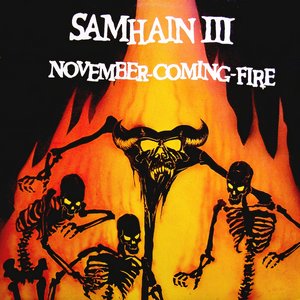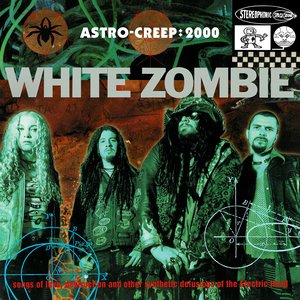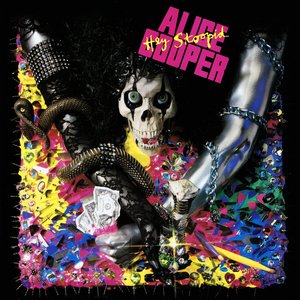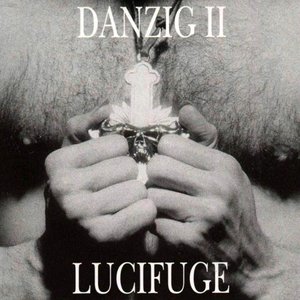Wiki
-
Release Date
1 January 1994
-
Length
13 tracks
Danzig 4p is the fourth studio album by Danzig. It was released in 1994 on American Recordings following 1993's highly successful Thrall: Demonsweatlive EP and singer Glenn Danzig's 1992 instrumental solo effort, Black Aria. Though it is properly titled Danzig 4p, most fans, and the band members themselves, usually refer to it simply as Danzig 4. In various 1994-95 interviews, Danzig explained that he did not wish to give the album a title, as he felt that a logo or printing would ruin the artwork, which he wished to stand on its own. After pressure from representatives from American Recordings, who did not want to release an unlabeled album for fear that sales would plummet, Danzig relented and allowed a sticker reading "Danzig 4" to be placed on the album's cellophane wrapper. To the right of the "4" he added a tiny letter "p", as a joke, he said, in reference to the "Four P Movement". The following information on the album title was supplied by American Recordings in 1994:
"The Four P movement is an alleged Satanic cult operating throughout the United States. An offshoot of the notorious Process Church of the Final Judgment, the Four P movement takes its name from the Process' original sigil: a swastika-like form composed of four interlocking Ps. The Four P movement was supposedly begun in 1967, and has been connected to a number of ritual killings across the country, including the Son of Sam killings in New York and the Manson Family in California."
It is notable as the band's final album on American Recordings, and as the last to feature the original lineup of John Christ (guitar), Eerie Von (bass), and Chuck Biscuits (drums). Shortly after the album had been recorded, Biscuits left the band, returned, and was finally fired. Just prior to the album's release he was replaced by Joey Castillo. Von and Christ also intended to leave the band, but decided to stay for the remainder of the tour supporting the album and left the band on July 5th the following year.
The CD release contains an unlisted or "hidden" thirteenth song that is not included on the cassette and vinyl versions of the album. According to various interviews with Glenn Danzig, "Invocation" is its title. After "Let It Be Captured", there are several "blank" tracks, so that "Invocation" is numbered track 66. CD Players that display the "current track number" and "total disc time elapsed" in minutes thus read 66 61:38 on the display as the final track starts. This is perhaps an intentional reference to The Number of the Beast and the song "We Are 138" that Danzig wrote during his days in The Misfits. The guitar tracks for "Cantspeak" are really those of "Let It Be Captured" played in reverse, or "backmasked". The instrumental tracks of "Invocation" are unique to that song, but are likewise backmasked, as is Glenn Danzig's spoken introduction: "All right, let's hear it back". Danzig had earlier used the same effect on the song "Possession", from the 1988 debut album. Although the songs "Crucifixion Destruction" and "White Devil Rise" were mentioned in interviews and articles throughout 1994, with Danzig even discussing the latter in some detail, neither song was included on the final version of the album. Along with another outtake from the same sessions, "The Mandrake's Cry", these were finally released in 2007 on the first disc of The Lost Tracks of Danzig (with "Crucifixion Destruction" under its correct title, "Satan's Crucifiction").
The first pressings of the album were sold in a distinctive cardboard sleeve, which Glenn Danzig claimed was more like that of an old-fashioned LP and more environmentally-friendly than the common plastic CD jewel case. Since this initial release of the album, its distinctive cardboard packaging has been replaced by the jewel-case. The original packaging was too small to fit securely in most retail outlets' plastic theft-deterrent CD trays, and the album is legendary for being "the most stolen CD in history" (a distinction that is not, however, officially documented and is possibly unprovable). Glenn Danzig has referred to the symbols on the album cover as "Vehmic runes" that spell out "Danzig". They were taken from the alphabet of a secret tribunal group from Medieval Germany called the Vehmgericht. The entire alphabet is illustrated in Nigel Pennick's Magical Alphabets book. The liner notes contain a panoramic picture of the four band members in propped up caskets as a Bill Clinton impersonator shakes hands with a man wielding a sniper rifle.
Like Danzig's previous three albums, Danzig 4 has been labeled with a Parental Advisory (originally in the form of a sticker until the repackaging in the jewel case) since its initial pressings, despite the absence of common profanity.
Music videos were released for the songs "Until You Call on the Dark", "I Don't Mind the Pain", "Cantspeak" and "Sadistikal". The "Cantspeak" music video appeared on Beavis and Butt-head, in the episode "Animation Sucks". Joey Castillo appears in Chuck Biscuits' place in the music videos for "Cantspeak" and "I Don't Mind the Pain". All music videos from the album are featured on Danzig's Il Demonio Nera DVD.
Album descriptions on Last.fm are editable by everyone. Feel free to contribute!
All user-contributed text on this page is available under the Creative Commons Attribution-ShareAlike License; additional terms may apply.












